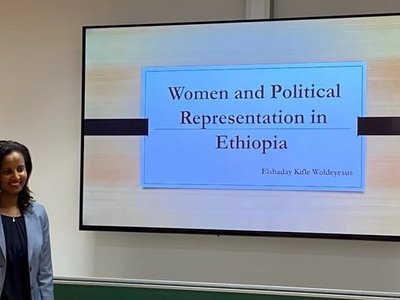

My doctoral thesis is entitled “Women and Political Representation in Ethiopia” and was part of the APPEAR project Advanced Academic Partnership for Legal and Human Rights Education | AAPLHRE. The general objective of the research was to assess the effectiveness of women’s political representation in Ethiopia. Focusing on substantive representation of women’s interests and concerns in the policy making process, the research examined the role of the state, women’s organizations, and the gender machinery at large in promoting or impeding the representation of women. I collected the primary data in three phases between November 2018 to January 2021. The field studies were conducted mostly in Addis Ababa, the capital of Ethiopia, while I made short visits to three cities and their adjacent rural areas in Amhara and Oromia Regional States. I conducted in depth interviews, focus group discussions, and observed several workshops and conferences related to women’s political representation.
Taking the electoral lawmaking process of 2019 as a case study, the research found that despite the conducive political environment and the unprecedented democratic nature of the undertaking, the weakening of women’s advocacy organizations was the major factor that led to the failure of inclusion of women’s interests in the electoral lawmaking process. In addition, although the state had taken remarkable measures by appointing women to high echelons of government, the shortcomings in its commitment to institutionalize such actions and its limited efforts to strengthen the gender machinery were the other drawbacks. Thus, in order to be sustainable and to have a truly transformative effect, institutionalization of these measures is vital, along with shifting away from instrumentalization of women’s representation and gearing the discourse towards a focus on women’s equal political representation as a right and a goal on its own merits. The thesis concludes by emphasizing the importance of strengthening women’s organizations, particularly through utilizing the current political reforms to revitalize and reimagine state-led mass women’s organizations, and to remodel them as genuine democratic platforms through which women at the grassroots level can make their voices heard.
The APPEAR programme aims at strengthening the capacity of higher education institutions in the partner countries. Thus, my PhD studies in law and politics at University of Graz significantly contributes to address the capacity shortage of my home institution, the Center for Human rights, in these areas and to limit its reliance on visiting professors. Moreover, one of the major objectives of APPEAR is to enhance the research capacity of my institution and also to contribute to the country’s development endeavour in areas of gender and governance. My specialization in the field of the interface between law, politics and gender will enhance the capacity of the Center to engage more in research and advocacy on gender and governance issues. The Addis Ababa University, being the largest and most influential public university in the country, provides many opportunities to engage in and influence policy making. Therefore, the research and advocacy efforts of the Center will have meaningful impact on discourses and policies of gender and governance issues.
As there is a dearth of research on women and political representation in Ethiopia, my research contributes to filling the gaps in research regarding substantive representation of women especially beyond parliament. Moreover, by critically analyzing the strengths and weaknesses of various existing governmental and autonomous structures and institutions in contributing to women’s substantive representation, it identified ways to ensure the effective substantive representation of women in Ethiopia. With the focus and strong interest of the government to increase the political representation of women, the research provides policy makers with a better understanding of the process and recommendations of effective mechanisms to enhance women’s representation which will enable them to make the right decisions.
During my stay in Austria in the past four years I had the opportunity to take important lessons from the culture and way of life in Austria. Most of all, I was impressed with the general culture of respecting women. Despite the remaining challenges to achieve full gender equality, it was enlightening to see how women are empowered and the equal opportunities they are afforded to pursue their dreams. Even though, social and cultural change take time, my experience living in Austria had provided me with the hope that dramatic change in gender relations is possible and encouraged me to work for the rights of women in Ethiopia with renewed vigour.
Elshaday Kifle Woldeyesus currently works at the Center for Human Rights at the Addis Ababa University. She started her doctoral research on “Political Participation of Women in Ethiopia” at the University of Graz in October 2017 and successfully defended in November 2021. Previously she was a researcher at the University for Peace – Africa Programme and at the Global Forum on Law, Justice and Development, World Bank. She holds a master’s degree from the United Nations mandated University for Peace in Costa Rica.
